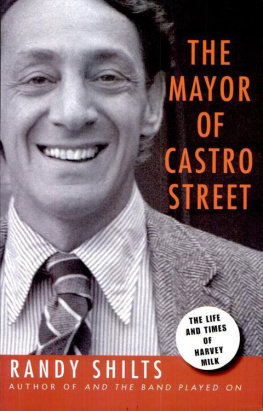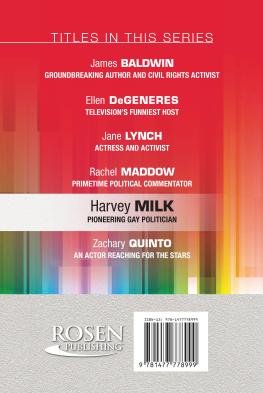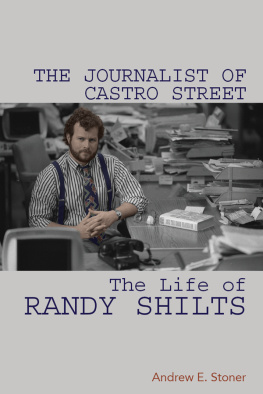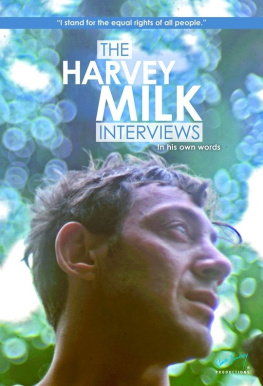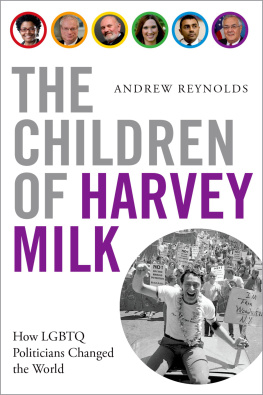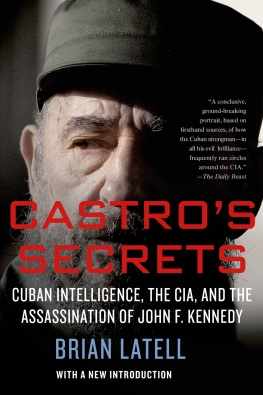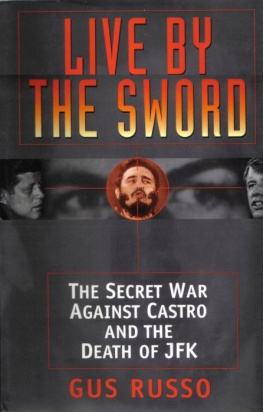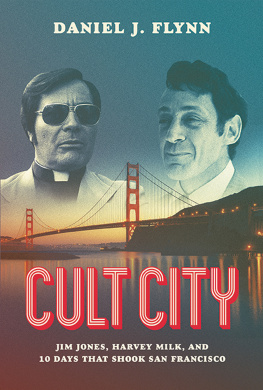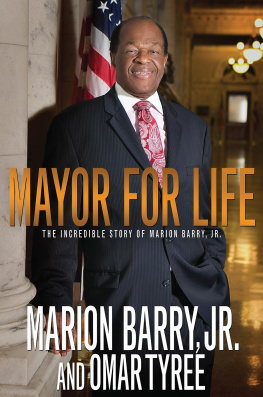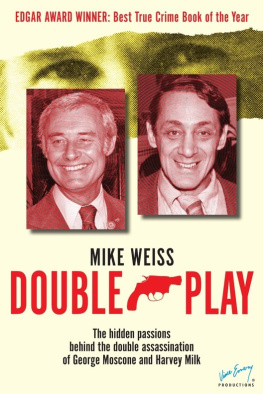Prologue
Eleven A.M. , November 27, 1978. A huddle of disbelieving reporters crowds around a locked door in San Francisco City Hall. A few feet away, down a narrow hallway and behind another closed door, the lanky body of Supervisor Harvey B. Milk sprawls face down in a spreading pool of blood.
The outer door is opened and closed by the police and city supervisors; reporters knock elbows trying to get a glimpse of any detail. They dont know what theyre looking for, but its their job to look anyway. A television crew bursts on the scene, adding to the confusion. The mayors been shot. No, Harvey Milks been shot. Theyve both been shot? Are they dead? With the Jonestown mass suicide only nine days behind them, the newspeople ask the obvious question: Is this the work of the Peoples Temple hit squad?
The small door opens again. Inside, the cadre of young aides Milk had gathered together fall into one anothers arms crying, their eyes dazed with confusion. Weve lost it, says one. Its over.
Harvey had always told them it would end this way, with bullets in the brain. But only when they see the black rubber body bag, covered with a crisp, pleated sheet, being rolled to the waiting ambulance does Harveys prophecy become the palpable reality that makes for bad dreams and bold headlines.
On the other side of City Hall, reporters mob another locked door. Behind it, a police officer picks the still-burning cigarette from between the fingers of Mayor George Moscone who, like Milk, was felled with shots in the chest and then coolly executed with two bullets pumped into the back of his head. Board of Supervisors President Dianne Feinstein must make the stunning announcement: Mayor Moscone and Supervisor Harvey Milk have been shot and killed. The gasps drown out her next words. Her voice breaks as she delivers the shocker: Police have a suspect. Supervisor Dan White.
A few blocks away, Dan White and his wife are walking from St. Marys Cathedral to Northern Station. White turns himself in to a former colleague and close friend. Within an hour, he puts his confession down on tape, telling how he crawled through the basement window, shot the mayor, reloaded his gun, and shot Harvey Milk because Harvey had smirked at him. The all-American boy, former paratrooper, onetime firefighter, ex-cop, and the one politician who had stood up to what he called the splinter groups of radicals, social deviates, and incorrigibles is charged with two counts of first-degree murder.
Hours later, forty thousand tiny flames quiver in the night breeze as mourners carrying candles trudge somberly to City Hall. In three-piece suits, black leather jackets, blue jeans, and neatly pressed dresses, they gather under the cloudy autumn sky to remember the gangly ward politician with the funny name, the thick black hair, the corny jokes and the New York accent. The speakers apologize for talking less about the powerful mayor, who was one of the best-known politicians in California, than about Harvey Milk, the unlikely populist who had lost three of the four elections in which he was a candidate and served less than eleven months in office once he was elected. The emphasis surprises few in the largely homosexual crowd. The mayor had given them leadership, but Harvey Milkthe nations first openly gay city officialhad given them a dream. A true function of public officials is not just to pass laws and approve appropriations, but to give hope, Harvey had said repeatedly in his five-year political career. In death, Harvey Milks dream started casting a shadow far larger than anything he could have fashioned in life; such is the nature of mortals and martyrs, dreams and their shadows. Even as the mourners ponder the constant turbulence of the recent troubled years in San Francisco, some start to speak of a Harvey Milk legend.
A stocky, handsome man has driven fifty miles through the night to join the mourners. He is confused by all this talk. Joe Campbell met Harvey Milk in 1956. For seven years they were lovers. What do politics have to do with homosexuality? he wonders. With the Harvey he knew, homosexuality was something to conceal, to be vaguely ashamed of, certainly nothing to walk down the street and crow about. The lover he knew was infinitely more concerned with redecorating his apartment than with changing the world.
Across the continent, a younger man watches pictures of the candlelight march on the late night news. Jack McKinley recalls the five years he spent loving Harvey Milk in New York City during the 1960s. That his stubbornly conventional former lover, a successful Wall Street financial analyst whose politics rarely strayed to the left of Barry Goldwater, would get shot to prove some political point seems unfathomable to him. But as McKinley looks at the mile-long procession of softly glimmering lights in San Francisco, hes sure of one thing. This is good theater and Harvey loved good theater.
Scott Smith barely feels alive as he walks down the marble steps of City Hall toward the sea of candles. He had met Harvey in New York when Harvey was a Broadway producer making the avant-garde scene as a forty-one-year-old hippy. They had moved to San Francisco together, established their camera shop, and lain in bed until the early morning hours arguing campaign strategy. Youre going to write about the life of Harvey Milk? he asks some months later, almost sardonically. Its all so strange. Nothing needs to be fictionalized. If somebody tried to write it as fiction, no one would believe it.
Swing low, sweet chariot. The song drifts gently into the night, as forty thousand stand beneath the grand rotunda of City Hall where Harvey Milk had worked and died. At midnight, the crowd melts quietly away. Candles are left to shimmer on the bronze statue of Abraham Lincoln sitting in front of City Hall, the lights casting a multitude of tiny shadows. The mourners turn to walk back toward Castro Street, where it seems right for this night to end. After years of searching and drifting, Castro Street had become Harveys hometown, and he had worked to make it a hometown for tens of thousands of homosexuals from around the world. The mayor of Castro Street, that was Harveys unofficial title. And now the mayor of San Francisco and the mayor of Castro Street lie dead. What is left is the dream and its lengthening shadow.
Acknowledgments
More than anyone else, Scott Smith, Harveys lover and the executor of the Milk estate, helped make this book a complete account of both Milks personal and political life. He spent many hours unselfishly recounting his own memories with Harvey and putting me in contact with many other people important in Harveys life. Like Scott, Joe Campbell also deserves special thanks for delving deeply into personal and sometimes painful memories about his relationship with Harvey. Im also indebted to Harveys friends Jim Rivaldo, Frank Robinson and Tom Randol for their help in the research phases. Political activist Michael Wong gave me the single most useful document for the book when he shared the detailed diary he kept of every interaction he had with Harvey for over five years. Jim Gordon of the Harvey Milk Archives, Bob Ross of the Bay Area Reporter and Charles Morris of The Sentinel also permitted me to intrude on them for many days, pouring over their files and back issues. Im indebted to Allan Berube of the San Francisco Gay History Project for sharing his intriguing research about the effect that World War II had on the San Francisco gay community. My friend David Israels spent long hours as both sounding board and prodder. Many journalists shared their perceptions with me while I was researching the book; among the most useful undoubtedly were Francis Moriarty and Victor Zonana. This work would never have known a place on a bookshelf without the faith of my editor, Michael Denneny. Thanks also to my friends Dan Yoder, Ann Neuenschwander, Tom Lang, my brother Gary Shilts and, of course, Steve Newman for their personal support during the writing process.
Next page
